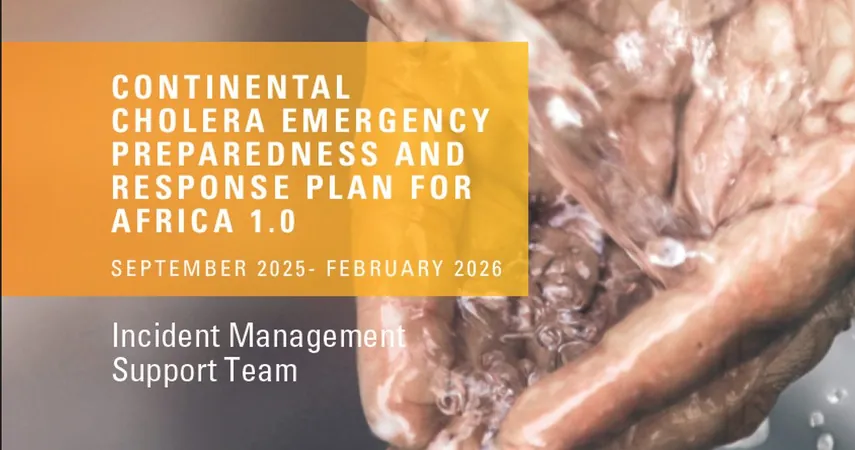
Cholera Crisis in Darfur: Africa's Bold New Strategy for Health and Peace
2025-09-04
Author: Wei
In the heart of Sudan's Darfur region, a deadly cholera outbreak is unfolding, compounded by a humanitarian crisis that shows no signs of resolution. Heavy rains, widespread displacement, and crumbling water, sanitation, and hygiene (WASH) systems have created a perfect storm for the spread of this lethal disease.
Recent data from the Africa Centres for Disease Control and Prevention (Africa CDC) reveals alarming numbers: all five Darfur states are witnessing high cholera cases, with North Darfur accounting for a staggering 57% of infections. The situation in South Darfur is particularly grim, with 66 out of 136 reported deaths in the region this year alone.
Worryingly, cholera has swept across all 18 states in Sudan, with children over the age of 10 making up 15% of infections. Khartoum State alone has recorded more than 24,000 cases and nearly 430 deaths since the beginning of this year.
The Broader Emergency: A Continent in Crisis
This crisis in Sudan is not an isolated incident; it is a part of a dramatic surge in cholera outbreaks across Africa, exposing critical weaknesses in health systems. Currently, 23 African nations are battling cholera, with the worst-hit countries including South Sudan, the Democratic Republic of Congo, and Angola.
A Bold New Plan to Combat Cholera
In response to this burgeoning emergency, African leaders have launched the Continental Cholera Preparedness and Response Plan 1.0. Spearheaded by the Africa CDC and the World Health Organization (WHO), and led by Zambian President H.E. Hakainde Hichilema, this ambitious six-month plan will require over $231 million to implement, alongside ongoing investments to produce vaccines and strengthen health systems.
The initiative emphasizes the critical role of strong political leadership to unite various sectors in addressing urgent public health challenges. It seeks to replicate the successful model used during the mpox response, using an Incident Management Support Team (IMST) to coordinate multinational efforts.
"Eliminating cholera is more than just a health objective—it is a moral imperative that can drive economic growth and pave the way for a prosperous future outlined in Agenda 2063: The Africa We Want," asserted President Hichilema.
Immediate Action Required to Avoid Catastrophe
Experts warn that without urgent intervention, Africa could witness over 200,000 new cholera cases and 6,000 deaths between September 2025 and February 2026. However, swift actions, such as deploying 10 million vaccines, establishing treatment centers, and engaging communities, can significantly eradicate the threat.
Dr. Jean Kaseya, Director General of Africa CDC, emphasized that cholera reflects deeper systemic inequalities within health systems. "Our response must be rapid, coordinated, and rooted in solidarity—we cannot allow vulnerable communities to suffer from preventable diseases."
A Multifaceted Crisis in Sudan
The cholera outbreak in Sudan is intricately linked to inadequate WASH infrastructure; nearly 90% of Khartoum's water treatment plants are currently non-operational, leaving many without access to clean water and increasing the risk of disease transmission. Additionally, Sudan is grappling with simultaneous outbreaks of dengue fever, diphtheria, measles, and pertussis.
Recent flooding has further exacerbated the crisis, displacing nearly 900 people in North Darfur. Amid ongoing conflicts, medical supplies and clean water are in short supply, complicating efforts to contain the disease.
Access to vaccines is alarmingly uneven, with regions in Darfur experiencing virtually no oral cholera vaccine coverage—the national average hovers just over 5.4%. Ongoing conflicts have made vast areas inaccessible for vaccination teams, leaving displaced populations vulnerable to outbreaks.
Urgency and Hope Amidst the Crisis
As the situation continues to deteriorate, the full extent of the outbreak may be obscured due to under-reporting and limited healthcare access. Nevertheless, the declining numbers of new cases in some affected regions provide a glimmer of hope. The cholera crisis serves as a stark reminder of the challenges faced by conflict-affected communities in Africa concerning managing preventable diseases.
Health authorities are urging for immediate enhancement of water and sanitation facilities, expanded access to treatment, and robust vaccination campaigns. The success of the Continental Cholera Preparedness and Response Plan hinges on timely actions, sustained funding, and the flexibility to adapt to the ground realities.
Ultimately, the ongoing crisis in Sudan illustrates the dire need for a comprehensive response rooted in peace and unity. "This cholera crisis is not just about public health—it’s a crucial reminder that without peace, health cannot flourish," concluded Dr. Kaseya.



 Brasil (PT)
Brasil (PT)
 Canada (EN)
Canada (EN)
 Chile (ES)
Chile (ES)
 Česko (CS)
Česko (CS)
 대한민국 (KO)
대한민국 (KO)
 España (ES)
España (ES)
 France (FR)
France (FR)
 Hong Kong (EN)
Hong Kong (EN)
 Italia (IT)
Italia (IT)
 日本 (JA)
日本 (JA)
 Magyarország (HU)
Magyarország (HU)
 Norge (NO)
Norge (NO)
 Polska (PL)
Polska (PL)
 Schweiz (DE)
Schweiz (DE)
 Singapore (EN)
Singapore (EN)
 Sverige (SV)
Sverige (SV)
 Suomi (FI)
Suomi (FI)
 Türkiye (TR)
Türkiye (TR)
 الإمارات العربية المتحدة (AR)
الإمارات العربية المتحدة (AR)